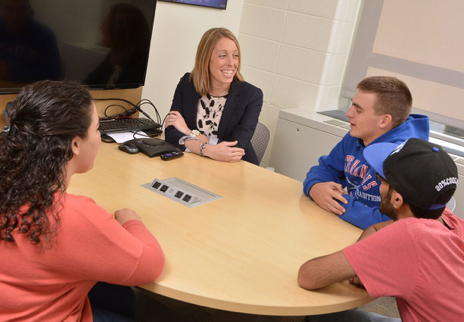Blog Entries
Formula for Success
At DeSales University, the Career Development Center (CDC) is a well-respected and highly valued student support team. Throughout my time spent as a member of the DeSales student body, I have benefited greatly from the resources that the CDC provides.
For example: I have spent early mornings and late nights reading through the career planning guide, used Bulldogs4HIRE to find job openings, received invaluable advice from Career Ambassadors such as Matt Walton and Nolan Beck, and most importantly, I mock interviewed with Career Coach, Aubree Robitzer. Thanks to the CDC’s training and expertise, I have obtained an exceptional opportunity to intern with a world-renowned company, PricewaterhouseCoopers (PwC).
Considering these items, the purpose of this blog is to outline the daily good habits and desire for success that the CDC has helped me discover within myself.
1. If you wanna fly with the eagles, you gotta rise with the roosters
In order to compete at a high-level [fly with the eagles], you must wake up early [rise with the roosters] and attack your daily obligations directly from the get-go. I’ve noticed that my most productive days begin at an early hour (anywhere between 6:30 and 7:30 AM), and my most unambitious days have had later beginnings. Getting out of bed and getting the juices flowing early is one of the keys to having a productive day.
One of my philosophies is: in order for me to have a solidly productive day, I must “exercise” my mind for at least one hour before actually starting my day. “Exercising the mind” consists of any low-dopamine activity that requires you to exert mental strength. For example: reading, journaling, studying, or planning.
Keeping dopamine production at a low-level enacts discipline and it strengthens your attention span. If you can ascertain low dopamine levels to start the day, you will be focused, diligent, and more inclined to complete difficult tasks throughout the rest of your day.
I like to wake up at least an hour before my first obligation of the day, or as early as possible allowing for a sufficient amount of sleep. I brew some coffee, then I put my phone away! Phone applications (such as social media) release massive amounts of dopamine which will, in turn, demotivate me from engaging in difficult tasks. I’ll spend the time that I would have spent on my phone reading an edifying book.
2. Think ahead!
When you’re getting ready to head to class, an important tip is to pack heavy. If you plan on going to class and staying out of your room to study after, make sure to pack enough things so that you won’t have to go back to your room during the day. On many occasions, I have gone back to my room mid-day and couldn’t resist napping or relaxing. Naps are great, but not if they are going to set your productivity off-kilter!
Just as the most productive days begin early, the most productive classes occur when I arrive a few minutes ahead of time to get a good seat and organize my notes before the Professor shows up. It’s beneficial to be organized going into a lecture because it will help you focus. Lack of tangible organization has proven many times to disrupt mental organization.
Looking towards your future, it’s important to get to know your professors. Your Professors will help you greatly on your course material, and they can be resources to you for the rest of your life. At the very least, be sure that they can at least match your name to your face.
3. Engage with the material!
College coursework can be incredibly challenging, so it’s imperative that you engage with the material outside class time. For example, the business student should constantly make comparisons between class material and what is going on in the markets, or in the general business environment. This practice will shed light on abstruse economical or financial theories.
Aside from applying your class lessons to real life, it also helps to chat with your friends about what you have been learning. If you engage in thorough conversations about your class material--especially the difficult stuff--it will enhance your natural inclinations towards your area of study.
That said, make sure that you can derive at least some sort of passion, interest, or enjoyment from your major studies. If you are completely uninterested in what you are studying, you should change your major. If you are an undergraduate in your twenties, you still have plenty of time to figure out what you’re passionate about. Changing majors can be one of the best decisions you ever make.
At the end of the day, take a few minutes to reread your notes and solidify what you have been learning. This final review will help you to retain your lessons much more effectively.
4. Lastly, set yourself some goals!
Planning for the next day is something that motivates me to wake up the next morning. If you ever find yourself to be unmotivated, set short term goals for yourself. These can be as simple as you want: anything from avoiding tardiness to catching up on your reading. As soon as you get your wheels rolling, you will tread out of your rut with ease!
Thank you all for reading. Now go out there and win!


Follow Career Development Center on Social
CDC on Facebook
Stay up to date with Career Development Center's posts on Facebook.
CDC on LinkedIn
See the latest posts on LinkedIn by the Career Development Center. Follow them on LinkedIn.
CDC on Instagram
See the latest posts on Instagram by Career Development Center.




